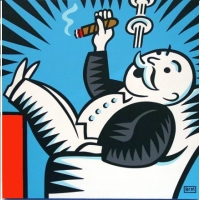Santa Cruz County Slashes Business with Five Big Felonious Banks

Is too big to fail and too amorphous to jail too corrupt to trust?
That’s a question asked by Yves Smith at Naked Capitalism and answered by the Santa Cruz Board of Supervisors. The board, acting on a request (pdf) from Supervisor Ryan Coonerty, voted to “not do new business for a period of five years with Citigroup, JP Morgan Chase, Barclays, Royal Bank of Scotland and UBS as specified, and further direct that the County unwind existing relationships with these five banks to the greatest extent feasible.”
That means the county won’t buy the banks’ commercial paper or investment services, and will withdraw whatever funds it can from them.
Coonerty, and others, are not happy with the way big banks savaged the global economy and paid a pittance for their misdeeds. Bankers, by and large, did not go to jail and led the 1% to even greater riches in a world of growing inequality.
The supervisor was reacting specifically to the announcement by the U.S. Department of Justice (DOJ) on May 20 that four of the five banks mentioned above agreed to plead guilty to felonies for rigging the world’s currency markets. They messed with hundreds of billions of dollars a day in transactions for five years, right through the financial meltdown, and ended up paying just $6 billion in fines.
The banks made untold billions using a private electronic chatroom to manipulate the spot market’s exchange rate between euros and dollars. The fifth bank, USB, manipulated the London Interbank Offered Rate (LIBOR), the benchmark interest rate that banks charge to borrow from each other. One Barclays employee said in a chatroom, “If you ain’t cheating, you ain’t trying.”
No one went to jail.
Former U.S. Treasury Secretary Robert Reich said the banks will probably write off the fines as business expenses on their taxes, and praised the Santa Cruz move as a potential way to mete out justice in lieu of a deficient legal system. He noted that five Republican-appointed justices on the U.S. Supreme Court think that money is speech, but big banks don’t go to jail for felonies like people.
But that doesn’t mean communities can’t treat banks like felons and not hire them to handle public money. Since, in many states, felons lose the right to vote and participate in politics in other ways, Reich would also like to see banks, and bankers, lose their right to influence the political process for a period of time.
“Wall Street banks have been among the biggest contributors to political campaigns,” Reich wrote. “If they’re convicted of a felony, they should be barred from making any political contributions for at least ten years.”
Reich doesn’t fool himself that big banks will care about Santa Cruz’s relatively small $650-million municipal portfolio, but if other cities, counties, states and institutional investors follow suit, real reform of the banking industry might happen organically, without national legislation or a court order.
As Yves Smith pointed out, it’s only common sense “to stay away from known crooks.”
–Ken Broder
To Learn More:
The California County That's Leading the Way in Cutting the Banks Out of Its Economy (by Robert Reich)
A New Bank Boycott Movement Starting? (by Yves Smith, Naked Capitalism)
Global Banks Admit Guilt In Forex Probe, Fined Nearly $6 Billion (by Karen Freifeld, David Henry and Steve Slater, Reuters)
Four Banks Guilty of Currency Manipulation but, as Usual, No One’s Going to Jail (by Steve Straehley and Noel Brinkerhoff, AllGov)
Letter to Santa Cruz Board of Supervisors (County Supervisor Ryan Coonerty) (pdf)
- Top Stories
- Controversies
- Where is the Money Going?
- California and the Nation
- Appointments and Resignations
- Unusual News
- Latest News
- California Forbids U.S. Immigration Agents from Pretending to be Police
- California Lawmakers Urged to Strip “Self-Dealing” Tax Board of Its Duties
- Big Oil’s Grip on California
- Santa Cruz Police See Homeland Security Betrayal in Use of Gang Roundup as Cover for Immigration Raid
- Oil Companies Face Deadline to Stop Polluting California Groundwater





